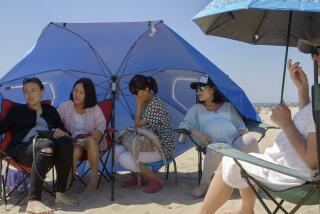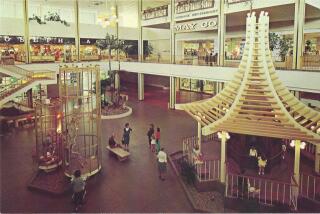High-end malls in Southern California court shoppers in China
As Chinese tourists spill from their tour bus into the Beverly Center, Charlie Gu hands each one a sleek black envelope. Inside: a Chinese-language map of the mall and a special discount card.
Gu, the center’s Mandarin-speaking Chinese specialist, asks shoppers about what they’re looking for and circles relevant stores on the map.
“L.K. Bennett is a favorite of Kate Middleton, Duchess of Cambridge,” he advises one. “You should definitely take a look.”
FOR THE RECORD:
Chinese consumers: An article in the March 22 Business section about how Southern California malls attract shoppers from China failed to make clear that Charlie Gu, depicted assisting a Chinese tour group at the Beverly Center, is employed by the consulting firm China Luxury Advisors, not by the Beverly Center. —
The personal touch is more than just the usual attempt to cozy up to well-heeled shoppers. It’s part of an effort to stay ahead of shifts in the global economy.
Chinese visitors represent an increasingly important piece of spending in the Southland and an influence that is stretching beyond just shopping to real estate and other investments.
In 2013, Los Angeles had 570,000 Chinese visitors, 20% more than in 2012 and double the number from three years ago, according to the Los Angeles Tourism and Convention Board.
They are also the biggest spenders. Chinese visitors in California shelled out an average of $2,472 a trip per person in 2012, followed by tourists from Brazil and South Korea, according to Visit California.
Chinese purchasers are a factor in fast-rising home prices in several Southern California communities. In addition, developers from China have been pouring money into commercial properties in downtown Los Angeles and other local areas.
And Chinese companies have begun going Hollywood, with recently announced investments in the Resolution talent agency and the out-of-bankruptcy Digital Domain visual-effects house.
The Chinese spending increase in California may be the result of shrinking investment opportunities back home, excess foreign currency and prices in the U.S. that are a relative bargain.
At high-end Southland malls like the Beverly Center, attracting the interest of individual Chinese is a courtship that begins long before shoppers board flights for the U.S.
The Beverly Center has its own account on Weibo, China’s equivalent of Twitter, which it uses to send out alerts about sales and new products. It hosts special visits for Chinese tour guides to acquaint them with the mall before they bring in busloads of clients.
Gu, a native of Shanghai who was hired in September, is the last piece of the plan. It’s his job to make sure that the Chinese shoppers find everything they need once they arrive.
“Chinese tourists now realize their significance in the retail world,” said Susan Vance, the Beverly Center’s head of marketing.
Escher Werner, a marketing executive at South Coast Plaza in Costa Mesa, hunted for months for the right Mandarin-speaking personal shopper for his high-caliber customers.
He recently hired Nancy Hsieh, a former Beverly Hills personal assistant. She gets paid $100 an hour for walking her Chinese clients through the boutique shops and offering styling advice, by appointment.
Often, her advice can make a difference on a big-ticket purchase — and potentially save a client from a fashion train wreck.
Hsieh recently suggested that a woman from Xian buy a $20,000 black fur coat instead of a $30,000 pink tie-dyed one she was considering. Because it would be the woman’s first fur, Hsieh counseled that the more traditional choice was the smarter one.
Werner also recently hired a local editor of a Chinese newspaper to spread the word about South Coast Plaza on Weibo. One post used a photo of award-winning Hong Kong actress Carina Lau Kar-ling in a Valentino dress. Another recommended Armani suits as one of the top four best men’s outfits for the new year.
Werner is now about to complete the key component of his plan to turn South Coast Plaza into a premier destination for Chinese visitors: opening a branch of famed Taiwanese dumpling house Din Tai Feng. He said he knew he couldn’t settle for food-court-style Chinese food but needed something that would convey authenticity.
“The bar is very high,” Werner said.
The deepening business relationship between the U.S. and China can be seen in the array of cities that visitors call home.
Many of the Chinese tourists today are coming not from the cosmopolitan metropolises of Beijing, Shanghai or Guangzhou but from far-flung provincial capitals.
These cities, places such as Xian, Wuhan or Kunming, have driven much of China’s economic expansion in recent years and created new pockets of wealth. About 40 of the 100 richest individuals in China made their fortune in second-tier or third-tier cities, according to the 2013 China Rich List produced by the Hurun Research Institute in Shanghai.
As Chinese from these cities make their first trips abroad, often to Los Angeles, they bring lots of cash but not much sophistication about Western brands or fashion.
“We are seeing more Chinese faces from emerging cities in our tour groups,” said Jasmine Wang, a guide for Shanghai-based Spring Tour. Tourists from China’s “Big Three” cities, she said, now prefer to travel independently, not with groups. The new tourists from the hinterland need a lot more hand holding once they arrive.
The visitors Gu greeted recently at the Beverly Center came from Shenyang, a city of 5 million in China’s north.
One family was looking for a pair of new shoes for their son and some casual wear from Juicy Couture for a friend. But they didn’t have much time allocated to shopping, nor did they know where to start among the 160 boutiques at the Beverly Center, which include brands such as Burberry, Prada and Fendi.
Gu, 28, doles out fashion advice, knows which brands are hot in China and which stores are holding sales.
“Many of these visitors from Wuhan, Chengdu and Shenyang have financial capital that far surpasses their social capital,” said Sage Brennan, co-founder of China Luxury Advisors, a consulting firm that advises Beverly Center and several other U.S. clients on attracting Chinese consumers.
Werner began traveling to China to promote South Coast Plaza a decade ago, but in the last few years he began skipping Beijing and Shanghai and traveling instead to mega-cities in China’s less-developed west. There, Werner said, he found an eager reception for information about the mall.
“They are all interested in where it’s located,” he said, “and everyone asked me what a plaza is.”






